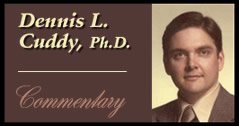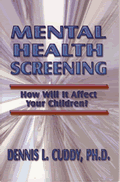Other
Cuddy
Articles:
Sept. 11:
Hold Government
Accountable
An
Economic Assault on
African-Americans and Others in The US
NEW EDITION OF THE BLP'S TEXTBOOK STILL HAS PROBLEMS
By
Dennis L. Cuddy, Ph.D.
March 19, 2007
NewsWithViews.com
On March 8, the Bible Literacy Project (BLP) issued a press release saying it "seeks to stop the spread of misrepresentation and inaccurate reporting" about its textbook, THE BIBLE AND ITS INFLUENCE, which has just been revised. What "misrepresentation and inaccurate reporting," and by whom? I have quoted from the textbook itself to demonstrate its errors and other problems. Dr. D. James Kennedy, Dr. John Hagee, and a Pro-Family organization have also seen errors in the textbook's first edition and criticized it.
For my own part, I'll be glad to stop saying, for example, that the textbook itself misrepresented Christ's statement about parables, because the new edition has corrected that and some other errors. (The BLP website falsely claimed its first edition contained no errors.)
But even the new edition still has problems. First, there are minor mistakes, such as when it refers to "the incarnation and redemption of Christ" (page 44 Teacher's Edition). Since Christ obviously needed no redemption, the phrase should be "the incarnation of, and our redemption by, Christ."
Secondly, while the BLP textbook on page 45 correctly indicates that Milton influenced how many look at THE HOLY BIBLE, it also unfortunately quotes from a book by Margaret Crook saying "he [Milton] has influenced the Bible," which would be chronologically impossible.
Thirdly, on page 44 of the BLP new textbook's Teacher's Edition, one reads "that the sin of Adam. . . was ultimately a blessing." Obviously, sin itself isn't "a blessing," so the phrase should say that it "resulted in the blessing" of our redemption by Christ.
Then there is the problem of having the same mistake in the revised edition as there was in the first edition. The revised edition on page 161 still says the Book of Job "provides no clear cut moral or answer to Job's situation." Just as I asked in my CHRISTIAN POST article, "The Bible Literacy Project Under Fire" (May 1, 2006), how can anyone read the last chapter of Job (Chapter 42) and still say there's no clear cut moral? Job's situation turns around after he repents (verse 6) and prays for his friends (verse 10). On page 156 of the revised edition, one even reads that the Book of Job "puts God on trial for the mysteries of human suffering." God doesn't have to plead His case before any man. This notion of putting God "on trial" implies that man is in a position to "judge" the rightness or wrongness, fairness or unfairness, of God's actions. But who is man to sit in judgment of God?
The next problem area for the revised textbook is that it contains lessons which could undermine traditional Biblical beliefs. First, on page 41 of the textbook's Teacher's Edition, it asks students to report on similarities and differences between the flood in Genesis and floods that "appear in the myths and folklore of many world cultures." A student might get the idea from this that the flood in Genesis is a myth or folklore. The BLP will claim it's not saying the Genesis flood is a myth or folklore, and that's correct. But then what's the purpose of the lesson? A flood is a flood, right? Why not just compare the real Genesis flood with other real floods in history? Why does the BLP refer at all to floods that "appear in the myths and folklore of many world cultures"?
Secondly, the subtheme of much of the unit dealing with the House of Abraham seems to be the use of deception. In the "Recall" section of the Teacher's Edition of this unit, the word "trick" or its derivatives are used about ten times in 39 lines of text. A student could get the idea from this that some important Biblical figures (e.g., in the House of Abraham) cannot be trusted.
Then there is the continuing problem of "common ground," which the BLP seems to seek. For example, the BLP's textbook satisfies the criteria of its THE BIBLE AND PUBLIC SCHOOLS: A FIRST AMENDMENT GUIDE, which has been endorsed by the Council on Islamic Education. Thus, the textbook's Teacher's Edition refers to Islam as a "great" religion and doesn't deal with the reason Ishmael was not part of the Abrahamic Covenant.
In fact, the new textbook edition contains quite a lot about Islam, even though Islam obviously is not found in THE HOLY BIBLE. In the textbook's Teacher's Edition (page 52), it even suggests regarding Abraham, Sarah and Hagar that the teacher "may wish to explain that the traditional Islamic reading of this story (incorporated in the Qur'an) substitutes Ishmael for Isaac; Muslims see Ishmael as the oldest and the true successor to Abraham." In other words, they're teaching Islamic beliefs from the Qur'an in addition to teaching the principles of THE HOLY BIBLE!
Why is the BLP doing this? It's part of the BLP's overall approach, described on page T13 of the textbook's new Teacher's Edition, which advises: "The teacher needs to manifest respect for the various faith traditions ---- Jewish, Catholic, Protestant, Evangelical, Orthodox, other world religions, or no formal faith tradition at all." Page T21 continues this approach by stating: "Each student should be willing to respect the opinions and positions of every other student." And page T3 stresses that all those preparing the revised textbook "worked together to accomplish an overview of the Bible. . . that is fair to. . . nonbelievers as well."
|
Subscribe to the NewsWithViews Daily News Alerts! |
The problem with this approach is that while we should respect the right of others to hold whatever religious views they choose, this does not mean we should necessarily respect the views themselves. If, for example, the view of nonbelievers and those of other faith traditions is that Jesus made a false claim when He said, "I am the way, the truth, and the life: no man cometh to the Father but by me" (John 14:6), Christians have no obligation to respect that view. After all, they're basically saying Jesus was deluded or a liar, and such a view Christians cannot respect.
� 2007 Dennis Cuddy - All Rights Reserved
Order Dennis Cuddy's new book "Cover-Up: Government Spin or Truth?"
Sign Up For Free E-Mail Alerts
E-Mails are used strictly for NWVs alerts, not for sale
Dennis Laurence Cuddy, historian and political analyst, received a Ph.D. from the University of North Carolina at Chapel Hill (major in American History, minor in political science). Dr. Cuddy has taught at the university level, has been a political and economic risk analyst for an international consulting firm, and has been a Senior Associate with the U.S. Department of Education.
Cuddy has also testified before members of Congress on behalf of the U.S. Department of Justice. Dr. Cuddy has authored or edited twenty books and booklets, and has written hundreds of articles appearing in newspapers around the nation, including The Washington Post, Los Angeles Times and USA Today. He has been a guest on numerous radio talk shows in various parts of the country, such as ABC Radio in New York City, and he has also been a guest on the national television programs USA Today and CBS's Nightwatch.
E-Mail: Not Available
The problem with this approach is that while we should respect the right of others to hold whatever religious views they choose, this does not mean we should necessarily respect the views themselves.












